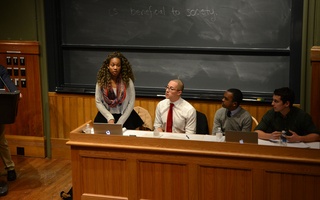Instead of the 200-plus turnout expected, only two dozen students attended yesterday's kick-off event for Face of America, a joint conference series on diversity organized by Harvard and Stanford students.
"A lot of people missed out on a really great event," said forum organizer Kenneth E. Ebie '01 of the satellite discussion with Stanford students on political correctness.
Attendance was low despite the 36 Harvard student groups that have endorsed the initiative. Ebie and Marcel L. Anderson '03, who also helped plan the event, attributed the low turnout to the hectic time of year for students.
The two-hour discussion, held in the Wiener Auditorium of the Kennedy School, featured student panelists from Harvard and Stanford as well as adult panelists affiliated with Stanford.
S. Allen Counter, the director of the Harvard Foundation for Intercultural and Race Relations, made a surprise appearance as a panelist for Harvard.
Harvard's student panelists began the discussion by defining political correctness and determining who, if anyone, it benefits.
Seng Yang '01, a former vice president of the Asian American Association, said political correctness allows minorities to feel as if they belong.
"A lot of people tend to forget there's a history of oppression in the United States," she said. "One of the reasons we have political correctness is so we can move forward."
Panelist Boleslaw Z. Kabala '03, who is also a Crimson editor, criticized the feasibility of those who support political correctness at all times.
"We have to decide between perfect justice or other goods we might settle for instead," Kabala said.
Student discussion initially focused around the language of political correctness, such as the use of "Asian" instead of "Oriental" and "queer" instead of "gay."
Student panelists also discussed whether political correctness was beneficial in the long run.
Several adult panelists, however, urged students to focus on the real-life issues revolving around race and diversity instead of the academic idea of political correctness.
Stanford panelist William Kennard, a former chairperson of the Federal Communication Commission, encouraged students to critically examine media representation of minorities.
James Steyer, a children's advocate and another Stanford panelist, called political correctness "a red herring" and added that students should focus on Supreme Court decisions as well as political issues such as affirmative action.
Read more in News
Wage Committee Reps PickedRecommended Articles
-
Stayin' AliveThere are buzzwords that float around political journalism, magazine articles and government classes. We pick them up for a few
-
Understanding Political CorrectnessNow that we've gotten the feel-good Freshman Week discussions on diversity out of the way, it's time to begin the
-
`Political Correctness' Hurts LiberalsTo the Editors of The Crimson: In his opinion piece titled "The Myth of `Politically Correct'" [December 11], J.D. Conner
-
Co-Opt and DiscreditPundits the world over reacted to University President Lawrence H. Summers’ resignation two weeks ago in typical fashion. They stereotyped,
-
 Students Debate Merits, Pitfalls of Political Correctness
Students Debate Merits, Pitfalls of Political Correctness













